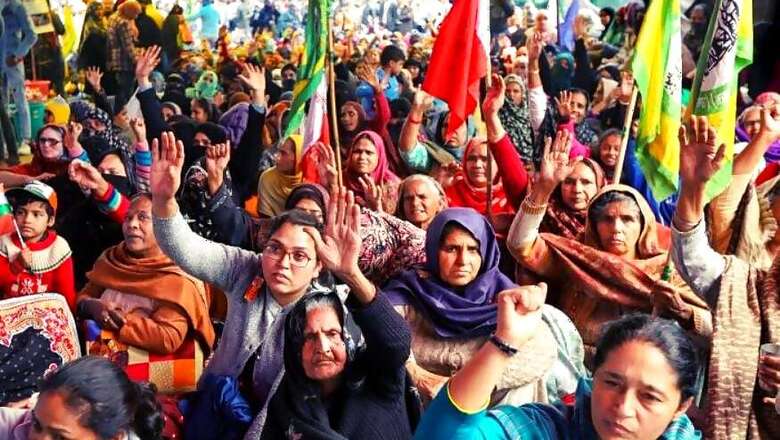
views
New Delhi: The women of Delhi's Shaheen Bagh locality are aware of the threat of novel coronavirus. So they modified their mode of protest to ensure social distancing as they were wary of withdrawing completely with their demands remaining unmet.
The Delhi police on Tuesday evicted the protesters, and removed every art installation put up by the demonstrators over the period of three months.
Gone are the tall map of India rejecting the CAA, NRC and NPR, the library at the bus stop, the detention centre model, the India Gate image, portraits of freedom fighters and makers of modern India, and the stage from where the women spoke and resisted the controversial changes by the Centre in the country's citizenship rules.
“We didn’t know that the government considers us also as some kind of a virus. Every piece of art and installation has been removed but they don’t realise the attack has been made on the symbols of idea of India,” said Shaista Bano, who has seen the visuals of police evicting the protesters and packing away or whitewashing every article of protest. She has participated in most of the demonstrations in the past three months.
"The government thinks we are too naive to understand the underlying intentions behind the eviction and vandalism at the protest site in the name of the coronavirus… inke liye toh shayad hum virus hain (for them, perhaps we are like virus too),” she added.
The women have left the spot, for now – and some have been detained. “But at this moment, it is expected of us to ensure safety for all … we will not go back on our demands and see how to continue the struggle,” Shaista said.
The legacy of Shaheen Bagh
The COVID-19 pandemic is closing down the world. Syeda Saiyidain Hameed, former planning commission member and women's rights activist, is aware about the eviction following the outbreak, and invested faith in the movement saying is “not just an event”.
"It was a vibrant movement, something unseen in the history of Muslim women. We were hoping for it to not become an event and it did not. With this the Muslim women became the partners in the development paradigm. They were not an instrument in anyone’s hands. They are in the mainstream upholding the Constitution. They are not relegated to a the corner of an Urdu daily column.”
The eviction has also brought the destruction of the site. But the gain is, Syeda said, “The Muslim women have achieved their identity and participation in the affairs of the country. They must not go back in the ghetto no matter how much other people try to get them.”
While the future will tell how the voices will be heard tomorrow, Syeda said, “It is good to see them out of the stranglehold of the traditional clergy and asserting the will of their own.”
Afreen Fatima, a student from JNU who has been associated with the movement since the start on December 15, 2019, wrote on social media: “Shaheen Bagh is not just the physical space. Shaheen Bagh is not just a protest site. It is all of us. It is a movement that we started for the equal citizenship, for our self-respect and dignity. You may remove our tents. Good luck removing our will to struggle.”
The women poets, protesters, and activists had earlier urged women to leave the site. The voices came as the coronavirus threatened the very existence they needed to fight their battles. The women have right now left the site, but they say, "The will to fight remains."



















Comments
0 comment